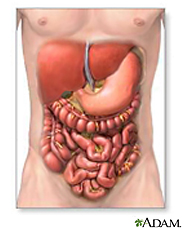 |
 |
 |
Other Health Topics:

-
Related Topics
-
Go Local
- Services and providers for E. Coli Infections in the U.S.
-
National Institutes of Health
- The primary NIH organization for research on E. Coli Infections is the National Institute of Allergy and Infectious Diseases
Languages
- Chinese - Traditional (繁體中文)
- Korean (한국어)
- Spanish (español)
- Tagalog (Tagalog)
- Vietnamese (Tiếng Việt)
E. coli is the name of a type of bacteria that lives in your intestines. Most types of E. coli are harmless. However, some types can make you sick and cause diarrhea. One type causes travelers' diarrhea. The worst type of E. coli causes bloody diarrhea, and can sometimes cause kidney failure and even death. These problems are most likely to occur in children and in adults with weak immune systems.
You can get E. coli infections by eating foods containing the bacteria. To help avoid food poisoning and prevent infection, handle food safely. Cook meat well, wash fruits and vegetables before eating or cooking them, and avoid unpasteurized milk and juices. You can also get the infection by swallowing water in a swimming pool contaminated with human waste.
Most cases of E. coli infection get better without treatment in 5 to 10 days.
National Institute of Allergy and Infectious Diseases
-
E. Coli
 (National Institute of Allergy and Infectious Diseases)
(National Institute of Allergy and Infectious Diseases)
-
E. Coli Infection(American Academy of Family Physicians)
Also available in Spanish
| Basics | Learn More | Multimedia & Cool Tools |
|---|---|---|
| Research | Reference Shelf | For You |
-
Overviews
- Escherichia coli(Centers for Disease Control and Prevention)
-
Latest News
- In the World of Germs, Man Bites Dog(01/28/2009, HealthDay)
-
Prevention/Screening
- E. Coli(Mayo Foundation for Medical Education and Research)
-
Use a Food Thermometer(Dept. of Agriculture, Food Safety and Inspection Service)
Also available in Spanish
-
Specific Conditions
- Enterotoxigenic Escherichia Coli (ETEC)(Centers for Disease Control and Prevention)
-
Related Issues
- Basic Information about E. Coli 0157:H7 in Drinking Water(Environmental Protection Agency, Office of Water)
- Escherichia Coli Infection and Farm Animals(Centers for Disease Control and Prevention)
- Focus on Ground Beef(Dept. of Agriculture, Food Safety and Inspection Service)
-
Games
- Food Detectives: Fight Bac(Partnership for Food Safety Education)
-
Clinical Trials
-
ClinicalTrials.gov: Escherichia coli Infections
 (National Institutes of Health)
(National Institutes of Health)
-
ClinicalTrials.gov: Escherichia coli Infections
-
Journal Articles
References and abstracts from MEDLINE/PubMed (National Library of Medicine)
- Article: Enterohemorrhagic Escherichia coli O157:H7: case report.
- Article: Identification and epidemiological description of enterohemorrhagic Escherichia coli O157 strains...
- Article: A role for connexin43 in macrophage phagocytosis and host survival...
- E. Coli Infections -- see more articles
- E. Coli and hemolytic-uremic syndrome -- see more articles
-
Directories
- Problems with Food Products(Dept. of Agriculture, Food Safety and Inspection Service)
-
Organizations
- Dept. of Agriculture, Food Safety and Inspection Service
-
National Institute of Allergy and Infectious Diseases

- Partnership for Food Safety Education
-
Children
- E. Coli(Nemours Foundation)
-
Hemolytic Uremic Syndrome (HUS)
 (National Institute of Diabetes and Digestive and Kidney Diseases)
(National Institute of Diabetes and Digestive and Kidney Diseases)
| Home | Health Topics | Drugs & Supplements | Encyclopedia | Dictionary | News | Directories | Other Resources | |
| Disclaimers | Copyright | Privacy | Accessibility | Quality Guidelines U.S. National Library of Medicine, 8600 Rockville Pike, Bethesda, MD 20894 National Institutes of Health | Department of Health & Human Services |
Date last updated: 29 January 2009 Topic last reviewed: 16 December 2008 |






